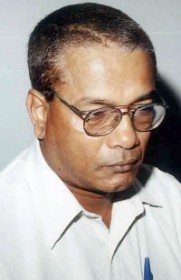Fisherfolk yesterday got an opportunity to air their concerns as regards timely payments for their catch from processors and other wholesale buyers at a meeting with senior Ministry of Agriculture officials.

Chief Fisheries Officer Vivek Joshi said they had noted that the issue was a growing phenomenon and wanted to nip it in the bud before it got as bad as the situation with rice farmers and millers.
However, only five small fishers turned up at the meeting held at the ministry’s Regent Road head office.
One fisher, Chairman of the Number 66 Fish Port Complex Indar Persaud said he was personally owed over $3 million by one of his large customers for fish taken last year. According to him, the man also owes his family about $7 million.
“Him nah mek no effort to pay,” Persaud said, adding that numerous efforts to contact the man have all been futile. “Me expect him fuh be here this morning that’s why mostly I turn up this morning,” said a visibly upset Persaud.
Permanent Secretary (PS) in the ministry Dr Dindyal Permaul said they would be calling in the parties involved to get all the facts and try to resolve the situation. He added that if talking it out did not work they will have to try some “gentle persuasion” failing which there was always the recourse to the courts.
Persaud seemed to be the only one present with a problem relating to the reason the meeting was called since the rest of the time was spent regurgitating a number of other problems the fisherfolk have been facing, including piracy.
One attendee said that at the Fisherfolks Convention held last June 29 there were some pledges made on the issue of security. At that event Agriculture Minister Robert Persaud had said that some four of the five million dollars which had been identified for the Anti-Piracy Revolving Fund would be utilised to purchase tracking devices to place on vessels in tandem with fishing co-ops.
“For every two the co-ops install we will install one,” Persaud had said. He added that they want to have the system in place within two months but this would depend on the response from fisherfolk.
Yesterday, Permaul pointed out that the initiative the minister had outlined was not accepted by the fisherfolk. He added that it was an insurance facility whereby the government would make some funds available and the fishermen would make continuous contributions and could benefit to help replace stolen engines.
“So far only about six persons have taken it up,” the PS said.
Persaud indicated that the fishers who had begun contributing were from the Number 66 co-op and he was urged to encourage the others to begin contributing.
A question was also raised about a soft loan facility for small fishers, which was mentioned at the June Convention. To this Permaul responded that the matter was being dealt with and that “approaches are being made to various institutions to participate.”
The fishermen from Number 66 also expressed concern that the prices they were receiving for fish in Berbice were not as good as what was being paid in Georgetown and wanted the ministry to intervene, a suggestion which they were told was not possible since the economy operated under a free market system.
Another suggestion was tabled that the ministry purchase the excess fish in the situation where there is a glut but this too was deemed impractical.
Permaul pointed out that prices would fluctuate and the fishermen have to make a business decision on how they react in the times when prices are low.
“If you find you can’t make it this round then maybe you can do something else, maybe salted fish or dry fish. You can also reduce the amount of your catch when fish is plentiful,” he said.
He added that it was in situations like these that fishing co-ops were useful since they can establish storage facilities that may prove too costly for individual fishers.
“You have to hold one head and run the co-ops along a business line, establish a committee of management to run it,” the PS stated.
Permaul added that the New Guyana Marketing Corporation could not buy so much as “a boatload of fish” because it did not have the resources and the co-ops would have to take the lead on this.
Other issues raised included boat licenses, land for aquaculture and NIS contributions.




